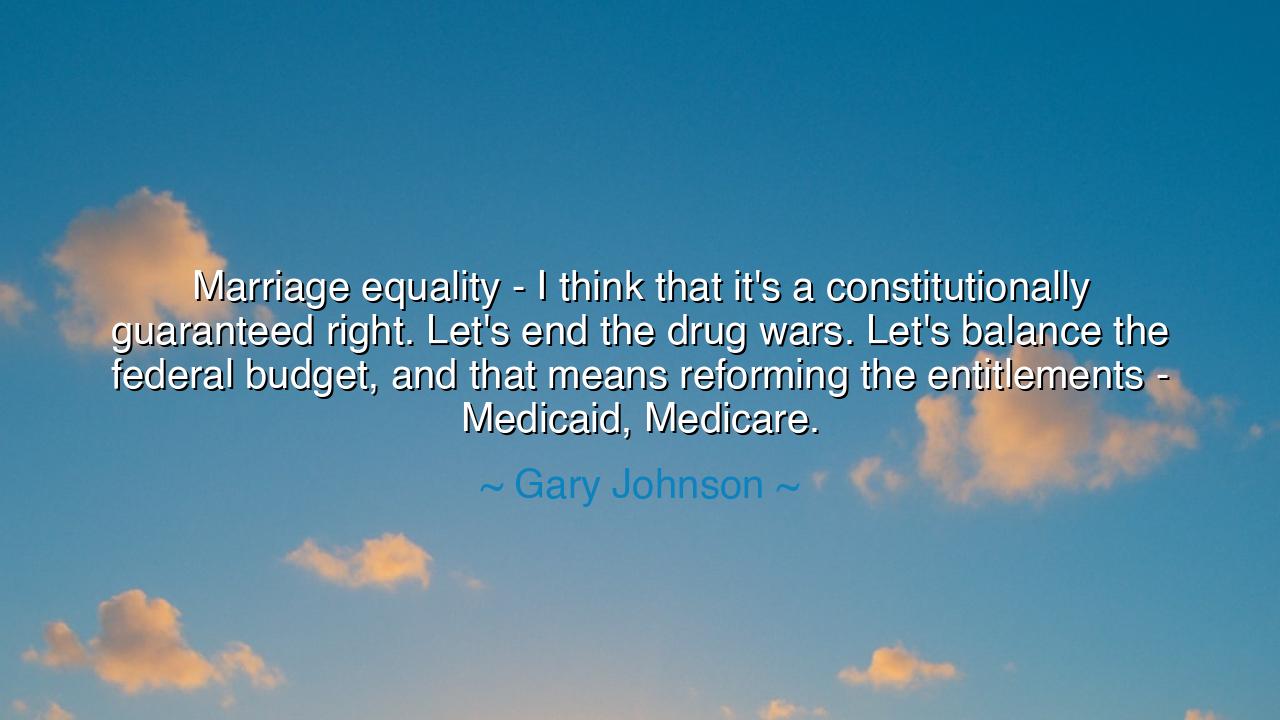
Marriage equality - I think that it's a constitutionally
Marriage equality - I think that it's a constitutionally guaranteed right. Let's end the drug wars. Let's balance the federal budget, and that means reforming the entitlements - Medicaid, Medicare.






Listen well, O children, for I bring to you the words of Gary Johnson, a voice who speaks of freedom, equality, and the responsibility of a society to evolve with wisdom and justice. He said, "Marriage equality - I think that it's a constitutionally guaranteed right. Let's end the drug wars. Let's balance the federal budget, and that means reforming the entitlements - Medicaid, Medicare." These words are laden with the weight of truth, for they speak to the fundamental ideals of justice and equality that our nation must always strive to protect and uphold. At the heart of this statement lies the call for marriage equality, a right that must not only be recognized but fully embraced as an inherent part of our Constitution.
To speak of marriage equality is to acknowledge that love, in its purest form, knows no bounds—no barriers of race, gender, or sexual orientation. Gary Johnson rightly points to the Constitution as the foundation for such a right. The promise of freedom and equality under the law is woven deeply into the very fabric of this document, and it is clear that the right to marry—regardless of one's gender or orientation—is no less sacred than any other. For too long, society has sought to place limits on the ways in which love and commitment are expressed. Yet, as the tides of history turn, we see that justice cannot be confined to the narrow view of tradition; it must expand to embrace all who seek to love freely. The Constitution is a living document, capable of evolving to reflect the ever-expanding boundaries of human dignity and freedom.
In the days of Rome, there were laws that sought to define the limits of marriage—dictating who could marry whom, based on status, class, and even race. Romans believed that marriage was not simply about love, but about empire, ensuring the strength and prosperity of the state by maintaining social order. However, over time, as Rome itself expanded, the laws surrounding marriage began to shift. Roman citizens from all walks of life were united in partnerships and alliances that transcended their differences. As the empire grew, so too did its understanding of unity. This evolution of thought was a slow process, but it mirrored the evolving understanding of justice that Gary Johnson speaks of today—a justice that embraces marriage equality as a constitutional right for all.
In more recent times, the fight for marriage equality has been embodied by the historic Supreme Court case of Obergefell v. Hodges in 2015. This case, which legalized same-sex marriage across the United States, was a watershed moment in the ongoing struggle for equality. The Supreme Court ruled that the right to marry is not dependent upon gender, but upon the fundamental rights of all people. It was a victory for love, a triumph of human dignity, and a reflection of the ever-evolving nature of justice within a constitutional framework. Gary Johnson's call for marriage equality is in direct alignment with this view—that the right to love and marry freely is guaranteed by the Constitution, just as much as the right to free speech or religious freedom.
But Johnson also speaks of the broader challenges facing society today—drug wars, the federal budget, and the reform of entitlement programs like Medicaid and Medicare. The fight for marriage equality cannot be viewed in isolation. It is part of a larger call for freedom and justice in all areas of life. The drug wars, which have disproportionately affected marginalized communities, are a stark reminder of the need for reform in areas of criminal justice and personal freedom. To truly embrace equality is to recognize that the laws governing personal freedom—whether in marriage, healthcare, or drug policy—must reflect the inherent rights of all individuals to live free from oppression and harm.
The lesson, O children, is one of vision and courage. Gary Johnson reminds us that the path to a just and equal society is not only about winning individual battles but about creating a broader vision of freedom and equality that applies to all aspects of life. Marriage equality is not a victory won in isolation, but part of a larger movement to ensure that the Constitution protects the rights of all individuals, regardless of race, gender, or sexual orientation. It is a reminder that we must not be complacent in the fight for justice but must continue to push for reform in all areas of life—whether that is in the legalization of marriage, the decriminalization of drugs, or the fair and equitable distribution of healthcare.
In your own lives, O children, take this wisdom to heart. Understand that the fight for equality is not a momentary effort, but a long and continuous journey. Stand up for the rights of others, whether that is through advocating for marriage equality, criminal justice reform, or healthcare access. Let your actions reflect the values of freedom and justice, ensuring that the rights of every person are protected and honored. And remember, as Gary Johnson so wisely calls upon us to do, let us work toward a world where all people, regardless of their differences, can live freely and with dignity—where the promise of the Constitution is not just a piece of paper, but a living force for good, for justice, and for the freedom of every individual.






AAdministratorAdministrator
Welcome, honored guests. Please leave a comment, we will respond soon